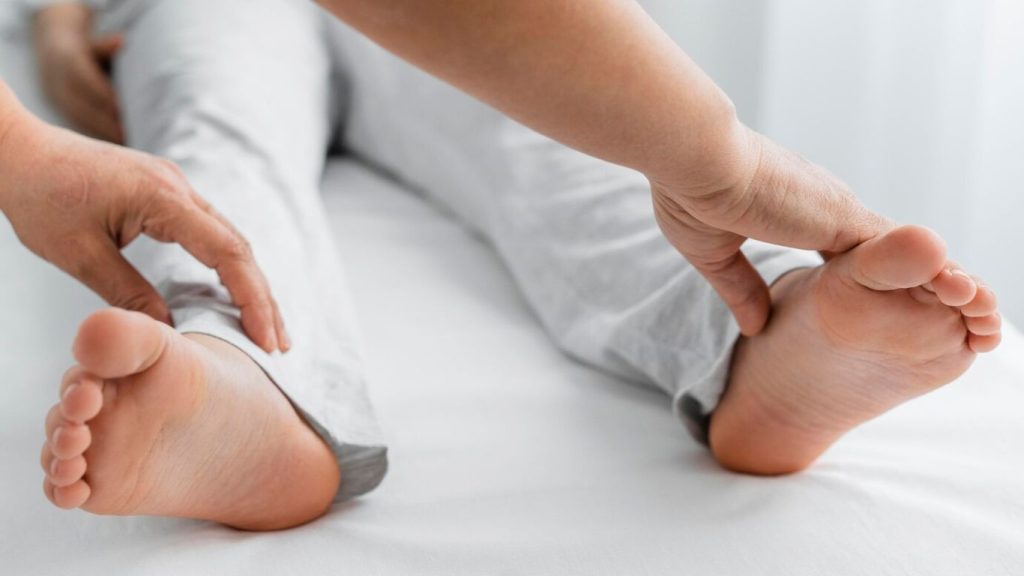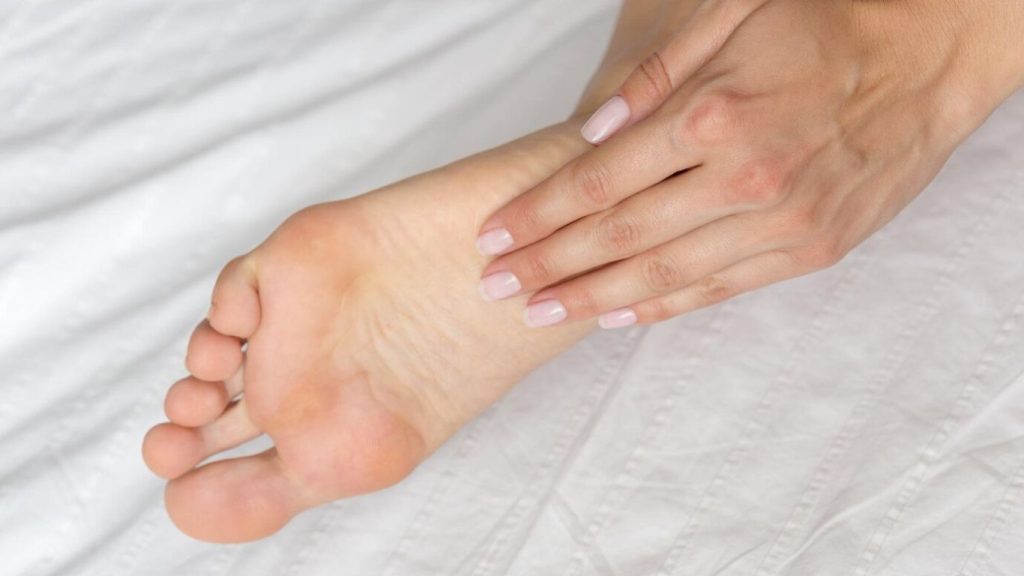Key Takeaways
- Neuropathy in the feet can cause burning, tingling, or numbness that makes restful sleep difficult.
- Elevating your feet with pillows can reduce pressure and improve circulation.
- Wearing loose, breathable socks or using a light blanket helps keep feet warm without irritation.
- A consistent bedtime routine—stretching, warm baths, or gentle massage—can relax nerves and muscles.
- Over-the-counter options like cooling gels or pain-relief creams may provide temporary comfort.
- If neuropathy pain regularly disrupts sleep, consult a doctor for targeted treatments or medications.
To sleep better with neuropathy in your feet, try elevating your legs with pillows to improve circulation and reduce discomfort. Wearing loose socks or using a light blanket can help regulate temperature without irritating sensitive nerves. A relaxing bedtime routine, such as stretching, soaking your feet in warm water, or gentle massage, may ease symptoms before bed. Over-the-counter cooling gels or pain-relief creams can also provide short-term relief. If neuropathy continues to disturb your sleep, talk to your doctor about medical treatments that can help manage the pain.
Peripheral neuropathy in the feet, often simply referred to as foot neuropathy, can be a vexing condition. Characterized by nerve damage, often due to diabetes or other underlying conditions, it leads to symptoms like tingling, burning, pain, or numbness. These sensations can make getting a good night’s sleep seem nearly impossible. But while challenging, there are strategies to help individuals with foot neuropathy sleep better. This article will explore these strategies in detail.

Understanding Foot Neuropathy
Peripheral neuropathy impacts the nerves outside the brain and spinal cord. When affecting the feet, symptoms can range from mild numbness to severe pain. It’s this discomfort and unusual sensation that can interfere with sleep. But understanding the condition is the first step in tackling sleep disturbances it may cause.
Strategies for Sleeping Better with Foot Neuropathy
1. Pain Management
Before sleep, it’s crucial to manage pain:
- Medication: Over-the-counter pain relievers, prescription medications, or even some topical treatments can help alleviate pain. Always consult with a healthcare professional before starting any treatment.
- Supplements: Some individuals find relief with vitamins and supplements, like alpha-lipoic acid or vitamin B. However, always discuss with a doctor before introducing any new supplement.
Read Also : How to Wear a Neck Brace

2. Optimize Your Sleep Environment
- Bedding: Use soft, breathable sheets and blankets to minimize friction and irritation on the feet. Consider a foot tent to keep bedding off sensitive feet.
- Temperature: Neuropathy can sometimes make feet feel excessively hot or cold. Maintain a cool, comfortable bedroom environment and consider moisture-wicking socks if sweating is an issue.
- Elevation: Elevating the feet slightly can help reduce inflammation and improve circulation, potentially alleviating some symptoms.
3. Mindful Relaxation Techniques
- Deep Breathing: Taking slow, deep breaths can help relax the body and divert attention from discomfort.
- Guided Imagery: This involves envisioning a serene place or scenario, helping distract the mind from pain and guiding it towards relaxation.
- Progressive Muscle Relaxation: This technique involves tensing and then relaxing muscle groups progressively, promoting overall relaxation.
4. Establish a Routine
A consistent sleep routine can make a world of difference:
- Sleep Schedule: Go to bed and wake up at the same time daily. This regulates the body’s internal clock.
- Pre-sleep Rituals: Engage in calming activities like reading, listening to soft music, or practicing relaxation techniques before bed.
5. Consider External Therapies
- Massage: Gentle foot massages can improve circulation and alleviate some neuropathy symptoms.
- Warm Baths: Immersing feet in warm (not hot) water can offer relief. Just ensure to dry feet thoroughly afterward.
- TENS (Transcutaneous Electrical Nerve Stimulation) Therapy: This involves delivering mild electrical currents to the skin, which can reduce neuropathic pain for some.
6. Footwear Choices
- Avoid Tight Footwear: Tight shoes or socks can exacerbate symptoms. Choose soft, well-fitted, and breathable footwear.
- Padding: Use padded socks or insoles to provide extra cushioning and protection.

7. Limit Stimulants
Avoid foods and drinks that contain caffeine or alcohol, especially in the evening. They can interfere with sleep quality.
8. Consult a Specialist
If sleep remains elusive:
- Sleep Specialists: They can offer tailored strategies and treatments to enhance sleep.
- Neurologist: They can provide insights into managing neuropathy more effectively.
9. Consider Sleep Aids
- Some over-the-counter or prescription sleep aids might help. However, it’s crucial to discuss with a healthcare provider, considering potential interactions with other medications or conditions.
10. Cognitive Behavioral Therapy (CBT)
- CBT for insomnia can help reframe negative thought patterns related to sleep and develop healthier sleep habits.
You can Read Also : How to Know If You Grind Your Teeth

Conclusion
Neuropathy in the feet can undeniably make sleep a challenge. But with a combination of medical treatments, lifestyle changes, and environmental adjustments, restful sleep can still be within reach. The key is to remain proactive, experiment with different strategies, and always seek guidance from healthcare professionals when introducing new treatments or therapies. Remember, good sleep is not just a luxury; it’s a pillar of health. With perseverance and the right tools, those with foot neuropathy can reclaim their nights.
Frequently Ask Questions
Foot neuropathy, or peripheral neuropathy in the feet, refers to nerve damage outside the brain and spinal cord affecting the feet. Symptoms can include tingling, burning, pain, or numbness.
The discomfort and unusual sensations from neuropathy, such as pain or burning, can make it difficult to find a comfortable sleeping position or maintain restful sleep.
Over-the-counter pain relievers, prescription medications, topical treatments, and certain supplements can help alleviate pain. Always consult with a healthcare professional before starting any treatment.
Using soft, breathable sheets and blankets can help. Some individuals benefit from a foot tent, which keeps bedding off sensitive feet, providing relief from pressure or friction.
Consider wearing moisture-wicking socks if sweating is a concern. Elevation can also help reduce inflammation. If you experience temperature sensitivities, ensure your bedroom is cool and comfortable.
Yes, techniques such as deep breathing, guided imagery, and progressive muscle relaxation can help divert attention from discomfort and promote relaxation.
Gentle foot massages, warm baths, and TENS (Transcutaneous Electrical Nerve Stimulation) Therapy can offer relief and improve sleep quality for some individuals.
Dealing with neuropathy in the feet requires a combination of medical and lifestyle strategies. Always prioritize comfort and seek expert advice when necessary to improve sleep quality.

[…] You can Read Also : How to Sleep with Neuropathy in Feet […]
[…] Read Also : How to Sleep with Neuropathy in Feet […]